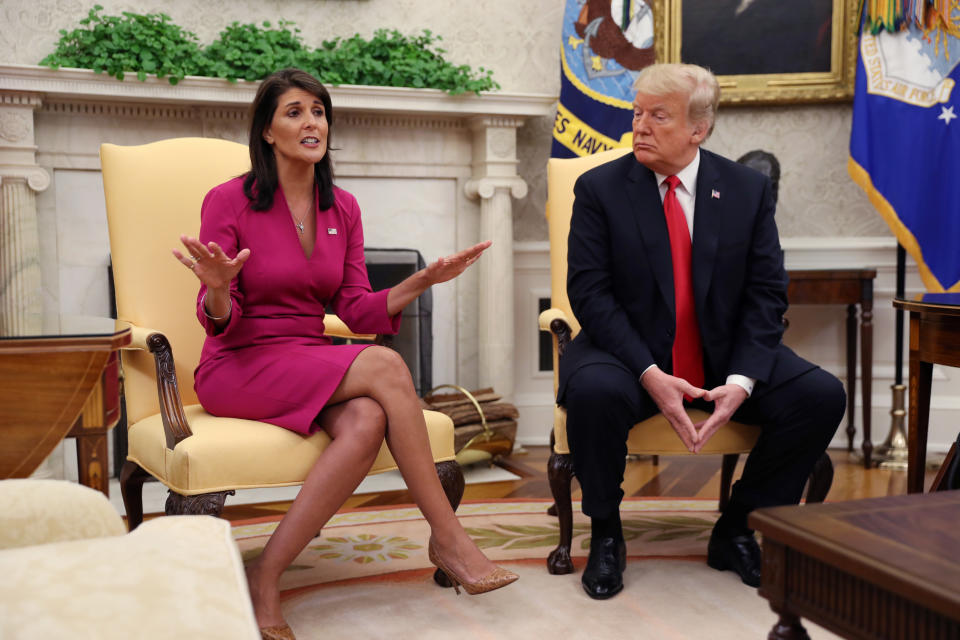
It’s taken quite a bit longer than expected, but on Tuesday, March 5 — which is known as Super Tuesday — former President Donald Trump looks poised to deliver a knockout blow to former South Carolina Gov. Nikki Haley’s hopes of winning the Republican nomination for president.
Meanwhile, President Biden is expected to easily defeat his minor Democratic challengers in his party’s nominating contests.
🇺🇲 Which states are voting on Super Tuesday
A total of 14 states will hold both Republican and Democratic nominating contests on Super Tuesday: Alabama, Arkansas, California, Colorado, Maine, Massachusetts, Minnesota, North Carolina, Oklahoma, Tennessee, Texas, Utah, Vermont and Virginia. Alaska will also hold Republican caucuses, and Democrats will complete their Iowa caucuses and announce results.
Additionally, American Samoa will hold its Democratic caucuses.
Most of the attention will be paid to the Republican contests because, unlike Biden, Trump still has a significant challenger in Haley.
🏆 The big prize: delegates
With 854 delegates up for grabs on the Republican side, Super Tuesday is the biggest voting day of the year before the November general election. Trump currently leads Haley in the delegate count, with 244 delegates to her 43.
🥊 Why it’s taken so long for Trump to finish this
Many thought Trump’s win in Iowa was the knockout blow or then his victory in New Hampshire. But starting in New Hampshire, Haley won a significant minority (around 40%) of the vote. And in a series of contests over the past several weeks, she has continued to be a thorn in Trump’s side.
🧩 How delegates get allocated
Most of the states holding primaries on Super Tuesday use a rule for delegate allocation called “proportional with trigger.” In many states, that means that if a candidate wins the contest with more than 50% of the vote, that person gets all the delegates. (If no one wins more than 50%, then anyone who gets at least a certain amount, usually between 10% and 15%, gets that same percentage of the delegates from that state.)
The two parties’ respective nominees are formally selected at the national party conventions over the summer, when delegates from all the states come together and choose their representative for the fall election.
🎺 How GOP primary rules help Trump
The rules of delegate allocation are complex and vary widely state by state. But they generally favor the candidate who is in the lead, and that’s Trump.
These trigger rules mean that in states where Haley might continue to win 30% to 40% of the vote — like California, Vermont, Utah and Virginia — she is quite likely to be shut out of the delegate haul because of the state primary rules that reward anyone who gets a majority.
However, there are other states, like North Carolina, where 32 of its 74 Republican delegates will be awarded proportionally to all candidates who finish with at least 20% of the vote. The other 42 GOP delegates in that state will be awarded, three at a time, by congressional district. In the congressional districts, anyone who receives at least 60% gets all three delegates in that area.
🫡 Haley’s last stand?
Haley has stayed in the race in part because she keeps winning a substantial minority, and because Trump is a uniquely flawed and vulnerable candidate in the general election. In recent days, she’s also indicated she believes Trump might subvert the Constitution if elected, retract her pledge to support him if he becomes the nominee and likened the Republican Party choosing him as “suicide for our country.”
However, except for a major surprise, if Trump sweeps Super Tuesday, Haley’s chances of beating him go from very slim to nonexistent.
🙂 Some good news for Haley
On Friday, Haley was endorsed by two Republican senators, both women: Sen. Lisa Murkowski of Alaska and Sen. Susan Collins of Maine.
Murkowski and Collins are both firmly in the moderate column of the GOP, so they won’t sway many hard-core Trump voters. But both of their states are holding primary contests on Super Tuesday, so the news of their endorsement is positive for Haley in both those places.
On Sunday, Haley won the Republican her first primary, in the District of Columbia. She earned 19 delegates with the win.
😃 Even better news for Trump
Voters in Illinois, Maine and Colorado had looked to remove Trump from the ballot in those states because, they said, he had violated the Constitution’s insurrection clause due to his actions surrounding the Jan. 6, 2021, riot at the U.S. Capitol.
But on Tuesday, the Supreme Court ruled 9-0 that individual states removing a candidate from its ballot would be unconstitutional. This is particularly good news for Trump because both Maine and Colorado will be holding primaries on Super Tuesday.
⚡ Why is it called Super Tuesday?
Every primary season, one day out of the election calendar is deemed Super. There’s nothing official about it — it just usually means that that’s the day with the most contests, making it the closest thing the U.S. has to a national primary.
⚡ Who can vote on Super Tuesday?
It depends on the state. If you live in one of the areas holding nominating contests on Super Tuesday, check with your state or local voting board on whether you are eligible to cast a ballot.
EMEA Tribune is not involved in this news article, it is taken from our partners and or from the News Agencies. Copyright and Credit go to the News Agencies, email [email protected] Follow our WhatsApp verified Channel









